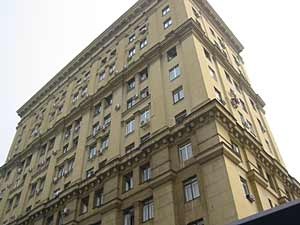
The system built to manage Russia’s nuclear legacy is crumbling, our new report shows
Our op-ed originally appeared in The Moscow Times. For more than three decades, Russia has been burdened with the remains of the Soviet ...
News

Publish date: May 19, 2020
News
Alexei Likhachev, head of Rosatom, Russia’s state nuclear corporation, has announced a step-down of the company’s precautions against the coronavirus, which saw many of its technicians isolated on the sites of their nuclear power plants to avoid their exposure to the virus.
The statement, which Likhachev made in a video address to Rosatom employees, comes six days after President Vladimir Putin announced an end to the nationwide non-working period instated six weeks ago to stem the spread of the illness.
In that speech – which coincided with the highest one-day rise in infections since Russia began recording them – Putin said the country’s constituent regions and businesses would be left to impose restrictions of their own should illness rates continue to spike.
Moscow’s mayor, for instance, ordered his city’s strict stay-at-home to remain in place until infection rates begin to decline. Farther afield, the Saratov region reinstated a ban on walks and outdoor activities a week after easing the restriction due to a spate of new coronavirus cases.
At Rosatom, Likhachev said 96 percent of the corporation’s 246,000 employees would return to work as usual as of Monday. He added that this would not apply to employees who are over 65, who suffer from chronic medical conditions, women who are pregnant, or are mothers with multiple children.
But Likhachev was keen to emphasize that working conditions would not been what they were two months ago, before international lockdowns began.
“All that until recently seemed out of the ordinary – masks, gloves, antiseptics, social distancing – has now become the norm for the months ahead, part of corporate culture,” he said.
When the coronavirus pandemic struck, Rosatom, like nuclear operators the world over, was confronted by a unique problem. Because the country’s 38 nuclear reactors are operated by small groups of highly specialized technicians who can’t work remotely, the utility branch of the corporation chose to isolate much of its staff on site at the plants where they work.
Staff members at most plants were told to move into onsite dormitories and dispensaries, where they could undergo daily medical monitoring in isolation from the outside world.
The cities that host nuclear power plants and research facilities – most of which are accessible to outsiders only by special permit – likewise beefed up measures meant to sequester nuclear workers and their families from possible infection from the population at large.
Still, a number of Russia’s so-called “nuclear cities” proved vulnerable to the virus. Workers at the Beloyarsk nuclear power plant, 1,800 kilometers east of Moscow, were isolated at the end of March when the daughter of one of the plant’s technicians returned from aboard with a case of the illness.
Days later the infection turned up in Sarov, a nuclear research center so secret that it didn’t appear on maps until the Soviet Union’s fall in 1991.
Other cities important to Russian nuclear research that have been impacted by the coronavirus include Obninsk, site of Russia’s first commercial nuclear reactor, Udomlya, where the Kalinin Nuclear Power Plant is located, and Zheleznogorsk, a closed nuclear city in Siberia that used to produce weapons grade plutonium for Soviet nuclear missiles.
In his address, Likhachev said that the infection had been contained in Sarov and Zheleznogorsk had been contained, but that a ‘complex situation” still confronted medical teams in Obninsk and the city of Elektrostal, where Rosatom fabricates nuclear fuel assemblies.
All told, Likhachev said that 403 Rosatom employees had tested positive for the coronavirus, 300 of whom had mild or even asymptomatic cases of the illness. Eight of Rosatom’s employees, all of whom worked in Moscow, have thus far died of the virus, he said.
Russia’s 11 commercial nuclear power plants operate a total of 38 nuclear reactors. Rosatom also has 36 power units at different stages of implementation in 12 countries around the world. It is currently constructing seven reactors overseas: two each in Bangladesh, Belarus and India, plus one unit in Turkey.

Our op-ed originally appeared in The Moscow Times. For more than three decades, Russia has been burdened with the remains of the Soviet ...

The United Nation’s COP30 global climate negotiations in Belém, Brazil ended this weekend with a watered-down resolution that failed to halt deforest...

For more than a week now — beginning September 23 — the Zaporizhzhia Nuclear Power Plant (ZNPP) has remained disconnected from Ukraine’s national pow...

Bellona has taken part in preparing the The World Nuclear Industry Status Report 2025 and will participate in the report’s global launch in Rome on September 22nd.